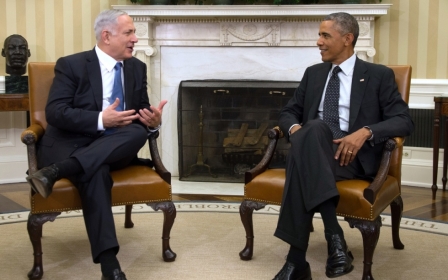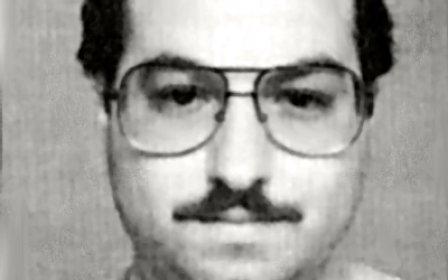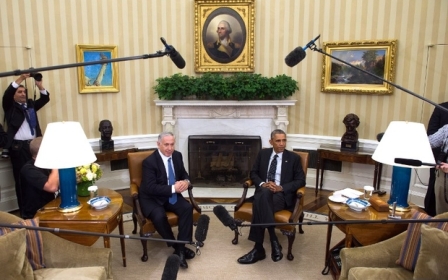Israeli spy Jonathan Pollard set for US release Friday

The United States will turn the page on one of the most contentious chapters in its relations with Israel when it releases convicted spy Jonathan Pollard on Friday.
Pollard, now 61, an American born in Texas to a Jewish family, has spent 30 years in prison for passing US secrets to Israel - but more than that, his incarceration has hung over Israeli-US affairs for three decades.
A US court jailed Pollard, a Stanford University graduate and former US Navy intelligence analyst, for life in 1987 after he pleaded guilty to one count of conspiracy to deliver national defence information to a foreign government.
Almost 30 years to the day of his arrest on 21 November 1985, Pollard will walk out of a prison in Butner, North Carolina, on parole. He was granted Israeli citizenship in 1995.
His official release date is Saturday, but he will be freed a day earlier in accordance with prison policy, an official told AFP. The move allows Pollard, who became very religious behind bars, to observe the Jewish Sabbath.
"In (the context of) 67 years of a very special relationship, this is the first case of espionage charges against a US national for the state of Israel in the US, somebody from the US defence establishment, from the intelligence community, also an American Jew," Dan Arbell, from the Centre for Israeli Studies at American University, told AFP.
"The American defence establishment over the years has been very sensitive about the information Mr. Pollard allegedly passed on to those he reported to."
Reviled by many Americans, Pollard has become a sort of celebrity in Israel, with individuals like Noam Shalit, the father of former Hamas hostage Gilad Shalit, saying: “I can only say that like all of Israel I will be very happy if he is released … I can’t speak to international relations … But on the human level, I’d say it’s about time.”
While behind bars, he has become an icon of the Israeli right and many Israelis embraced his cause, while the Israeli government has long demanded his release.
As his health deteriorated, Arbell said, calls for his release within Israel intensified - but the US stance only hardened.
"The feeling amongst Israelis is that he was given a very harsh sentence and harsh treatment," added Arbell.
"Perhaps at a certain point he will be allowed to travel and perhaps travel to Israel, but I don't think that it is going to happen any time soon."
Classified information
Having joined the US Navy, Pollard eventually received sufficient security clearance to access top secret and sensitive compartmented information.
Pollard made contact in June 1984 with an Israeli colonel, Aviem Sella, who was pursuing graduate studies at New York University, and offered to provide him with classified information.
He soon began supplying a stream of intelligence to the Israelis, reportedly thousands of documents.
Pollard is also alleged to have passed classified information to South Africa, and to have given his then wife documents on China for use in her personal business.
Washington later accused Pollard of causing considerable harm to US interests during the Cold War, although the full scope of his case has never been publicly disclosed.
He claimed only to have passed information vital to Israel's security that had been withheld by the Americans, but security experts feared the information might have ended up in the hands of the Soviet Union, at the time Washington's arch rival.
"US presidents wanted to set an example that spying on a friendly country should not be tolerated. There was no substantial damage for the US from the actual spying," Michael Brenner, director of the Centre for Israel Studies at American University, told AFP.
"For American Jews, it touches on the very sensitive nerve of potential 'dual loyalty' among US Jewish citizens, while for Israel it is a story about the loyalty of relations with its most important partner."
Iran deal decisive?
The Pollard affair may go back to the 1980s, but some believe he is still being used as a pawn in modern-day affairs.
Contacted by AFP, his lawyers, Eliot Lauer and Jacques Semmelman, refused to comment on the timing of his release.
Some believe it may be a conciliatory gesture toward an Israeli government that was irked by the nuclear deal between the West and Iran.
Brenner dismissed that notion.
"The parole after 30 years was expected by many, even without the Iran deal. It may help the strained US-Israeli relations after the Iran deal, but I think this was not the decisive cause for the release," he said.
In an interview with an Israeli publication in 2014, US President Barack Obama said regarding Pollard’s sentence: “I have no plans for releasing Jonathan Pollard immediately, but what I am going to be doing is to make sure that he, like every other American who’s been sentenced, is accorded the same kinds of review and the same examination of the equities that any other individual would provide.’’
Under the terms of his parole, Pollard should remain on US soil for at least five years, unless Obama authorises him to leave the country.
His lawyers said in July that Pollard had given assurances that he had a job and a place to live in the New York area.
But according to his family, the former spy wishes to settle in Israel with Esther Zeitz, a Canadian Jew involved in campaigning for his release and whom he married in prison.
New MEE newsletter: Jerusalem Dispatch
Sign up to get the latest insights and analysis on Israel-Palestine, alongside Turkey Unpacked and other MEE newsletters
Middle East Eye delivers independent and unrivalled coverage and analysis of the Middle East, North Africa and beyond. To learn more about republishing this content and the associated fees, please fill out this form. More about MEE can be found here.




